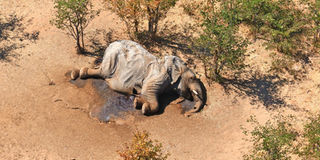Alarm as residents hunt endangered wildlife for meat

KWS has enhanced an anti-poaching drive to fight poaching.
What you need to know:
- KWS is working towards zero poaching of elephants.
- For the first time in years, KWS only lost 11 elephants to poaching.
- KWS have been losing more than 340 elephants a year.
Bush meat consumption is emerging as a major threat to Kenya’s wildlife, with communities in some parts of the country killing endangered animals for food.
The threat has escalated during the pandemic, with Kenya Wildlife Service (KWS) raising an alarm over the illegal hunting.
The increased poaching of wildlife for bush meat has been attributed to the economic damage brought about by the pandemic as families struggle to put food on their table.
“We are, however, sensitising the residents on the risk of eating bush meat and the killing of wildlife,” said KWS director-general John Waweru.
“Instead of buying meat at the butchery you hunt wildlife. This is a crime. If arrested, you will be prosecuted. Let us protect our wildlife,” he said.
KWS has enhanced an anti-poaching drive to fight poaching.
At the same time, KWS celebrated a major milestone after it was able to record zero rhino poaching for first time in 21 years. “Rhino poaching has reduced from a high of 59 cases in 2013 when poaching was at its peak to zero in 2020. The last time this feat was achieved was in 1999,” said KWS.
“We were able to achieve zero rhino poaching through the efforts of KWS rangers on the ground and a multi-agency approach,” said Waweru.
Pandemic effects
KWS is also working towards zero poaching of elephants. For the first time in years, KWS only lost 11 elephants to poaching.
KWS have been losing more than 340 elephants a year.
The KWS boss said they will enhance patrols and continue collaborating with local communities and multi-agency security teams to thwart poaching.
“We were able to anticipate what poachers were planning to do and stop them before they could strike,” said Waweru.
In 2019, Kenya lost about 38 elephants.
“Compared to South Africa which lost about 500 plus elephants, this is a big achievement. Kenya has taken a lead as far as anti-poaching is concerned. We want to keep the same records of zero poaching for rhinos and elephants as well. We will protect our wild species and their spaces ,” said Waweru.
But KWS has also suffered a blow after losing 80 per cent of its visitors due to the pandemic.
Tourism Cabinet Secretary Najib Balala said last year was difficult for tourism due to the pandemic .


